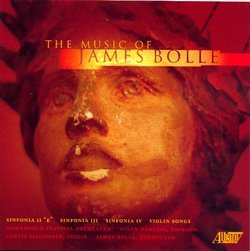Wit and Substance
J Scott Morrison | Middlebury VT, USA | 11/26/2009
(4 out of 5 stars)
"To me James Bolle was only a name I knew in connection with his long-time association with Monadnock Music, a New Hampshire summer music festival he founded in the 1960s and led for more than forty years before retiring to compose after the 2007 season. But I had never heard a note of his music until this CD came my way. The disc contains four 'sinfonias' named, coyly: 'II', 'III' and 'IV' and a set of four 'Violin Songs' for soprano and unaccompanied violin.
The Sinfonias could be considered one large composition as their structure allows them to be played together or singly largely because each is composed of mostly fairly tiny episodes, some lasting no more than a couple of seconds, others a minute or so, each section sonically distinct from the others. A kind collage of mostly tonal sound bits, one might say, which nonetheless have a rightness about them that is hard to explain yet which can be sensed on hearing them. Even though each sinfonia has four or five movements, it is difficult to know without looking at your player when one ends and the next begins. That is of little importance, however, because of the motley nature of each movement's constituent parts. The primary reaction I have to these works is that they are witty, amusingly variegated and lighthearted. (One hears echoes of Bolle's main teacher, Darius Milhaud, in this combination of high skill and insouciance.) One can imagine Mr Bolle chuckling as he constructed the works. There are snatches of hymns, patriotic tunes, bits of classical chestnuts, popular tunes, all slightly disguised as through a sonic prism. The three Sinfonias add up to about an hour of engaging music. All the performances were recorded live in 2007 and 2008 by the forces of Monadnock Music.
The distinguished new-music soprano Susan Narucki is heard, accompanied by violinist Curtis Macomber, in the four 'Violin Songs' set to poems of William Shakespeare , Oliver Goldsmith, William Congreve and Samuel Johnson. The set is dedicated to the memory of the composer's son and the poems are all in one way or another, and not necessarily gloomily, about the transitoriness of life and the inevitability of death. I was particularly amused by Bolle's setting of Goldsmith's ironic 'An Elegy on the Death of a Mad Dog.'
In sum, I was surprised and pleased at what I heard here, particularly since I had no idea Bolle was such an inventive composer. The performances are presumed to be definitive as they are under the direction of the composer, a very experienced conductor.
The text on the back cover of the CD, the only place where the CD's contents appear, is in tiny red print on a black background. I found it almost impossible to read. Recorded sound is clear and lifelike. Texts of the songs are provided in the booklet along with laconic notes by the composer about the works included as well as bios of the composer and the performers.
Scott Morrison"


 Track Listings (4) - Disc #1
Track Listings (4) - Disc #1